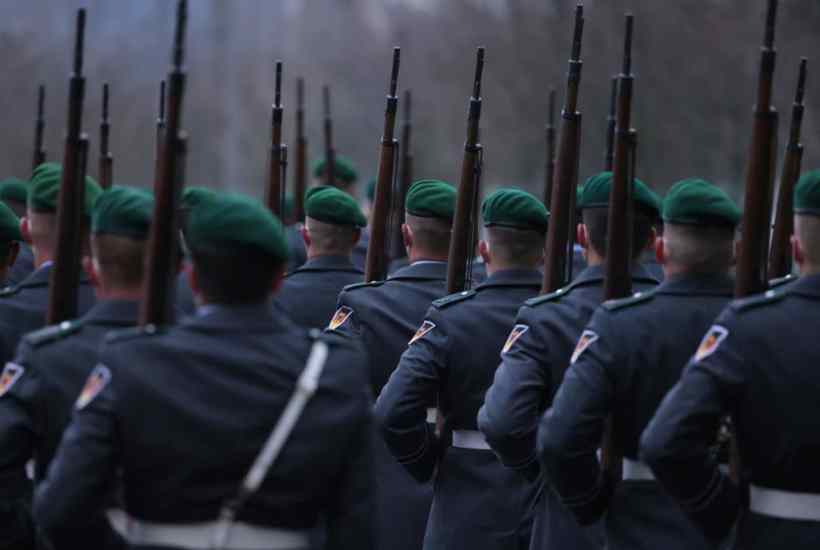The Chief of the German Army is angry. Alfons Mais’s words were coloured by evident frustration when he said that the Bundeswehr had been ‘caught with its pants down’ in the current crisis in Ukraine:
‘The options we can offer politicians to support the alliance are extremely limited’
Such outspoken political criticism is rare from high-ranking German military figures, which gave Mais’s rant even more resonance. He was particularly frustrated that he and others had raised concerns for years. ‘But our arguments to draw conclusions from the annexation of Crimea and put them into practice failed to cut through,’ he said. Mais admitted:
‘That does not feel great! I am pissed off!’
Others, too, have raised concerns about Germany’s readiness to support the Nato alliance and defend its own interests against foreign aggressors as needed. Berlin’s military spending had stagnated for some time and actually decreased as a proportion of GDP throughout much of the Merkel years until international pressure led to a turn of this trend in 2019.
The woeful underresourcing of the Bundeswehr has been carried by political parties across the spectrum. This means there has been no meaningful challenge to the hollowing out of Germany’s security forces over the years. And now Germany’s ally, Ukraine, is paying the price. Due to the complex and long-lasting historical legacy that still weighs down on the collective national psyche, many German politicians see anti-militarism and pacifism as badges of honour. They have made no secret of their desire to cut military budgets further. But such pacifism is hard to justify as Europe faces its biggest crisis in decades.
Even long-standing traditions of the German military such as the ‘Zapfenstreich’ (grand tattoo), held in honour of the 150,000 Germans who served in Afghanistan, have come under attack. Former Green politician Jutta Ditfurth said that: ‘when Germans carry torches…I can’t eat as much as I would like to puke.’ She spoke for many others in her deep contempt for her country’s military culture.
But in light of current events many German politicians have begun to realise that they have underestimated the security threat posed to Europe by Russia. Vice chancellor Robert Habeck, who had taken much criticism for his suggestion last May that Ukraine should perhaps be supplied with defensive weapons, said: ‘in hindsight we have to say, if we look at Putin’s words over the summer, if you look at all of his output combined, that the West, Europe and Germany have been too naive.’
The new leader of Angela Merkel’s CDU party, Friedrich Merz, also admitted that mistakes were made, not least by himself and his party. He told the Welt channel on Thursday:
‘We in Germany have all been a little too trusting – and I am not excluding myself from that.’
Finance minister Christian Lindner of the Free Liberals is also mounting pressure on Scholz to consider an increase in defence spending as a matter of urgency. Speaking on German TV, he said:
‘We need to get used to the fact that our armed forces have been managed down to depletion for many, many years.’
Former Defence Minister Annegret Kramp-Karrenbauer, who was once tipped to become Merkel’s successor as chancellor, was even more outspoken. She said:
‘I’m so angry at ourselves for our historical failure. After Georgia, Crimea, and Donbas, we have not prepared anything that would have really deterred Putin.’
Vladimir Putin’s brazen attack on Ukraine has certainly triggered a sharp response in the German political class. But will it lead to a long-lasting reappraisal of security spending and the country’s willingness to take responsibility in international conflicts? Defence minister Christine Lambrecht is certainly arguing for a firmer stance. She has demanded a rapid increase of military spending to bolster the country’s ability to support Nato in the escalating crisis in Eastern Europe, which she called the ‘core business of the German armed forces’. ‘In order to do that, they need the best supplies possible,’ she told the Spiegel magazine, ‘and that also means that we need to raise our defence spending.’
But asked what she made of the Army Chief’s frustrations, Lambrecht effectively told Mais to focus on the issue at hand:
‘I can only urge anyone in a position of responsibility to invest all of their energy to meet the challenges. That is the pressing issue of the hour.’
But his concerns are shared by one of his predecessors in office, Harald Kujat, who warned that:
‘If Russia takes the whole of Ukraine, then Nato troops and Russian troops will face each other directly at the Polish border.’
However, in its current state, there are serious question marks over the combat readiness of German troops at Nato’s Eastern flank. In 2019, the contingent made unfortunate headlines when it emerged they lacked not only vital equipment like tanks but also basics such as suitable clothing.
Germany must use the current crisis to take stock of the fact that the fence-sitting of the Merkel era cannot continue. Putin’s war in Ukraine should be a wakeup call to Europe’s largest economy to take its share of responsibility for security on the continent and elsewhere in the world. The Chief of the German Army was right when he asked, ‘when, if not now, is the time to reposition ourselves?’
Got something to add? Join the discussion and comment below.
Get 10 issues for just $10
Subscribe to The Spectator Australia today for the next 10 magazine issues, plus full online access, for just $10.


















Comments
Don't miss out
Join the conversation with other Spectator Australia readers. Subscribe to leave a comment.
SUBSCRIBEAlready a subscriber? Log in